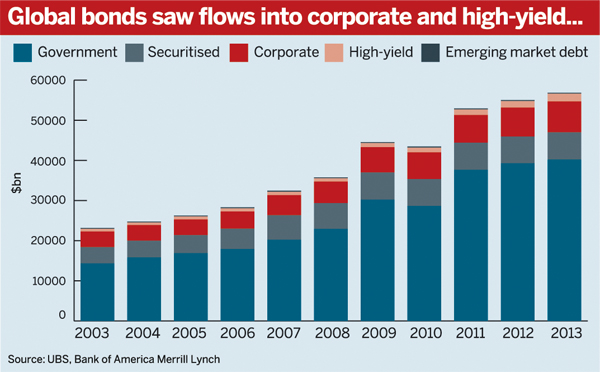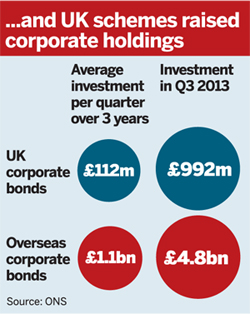Data analysis: UK pension funds drove more cash into domestic and overseas corporate bonds last year in order to benefit from repairing economies and to diversify sources of yield.
Scheme investors are being encouraged to tread carefully in a fixed income market that has seen further losses for emerging markets and concerns about a potential bubble in high-yield debt.
Office for National Statistics figures show the £992m ploughed into UK corporate bonds by schemes in the third quarter of 2013 was nine times the average quarterly figure over the past three years (£112m).
The overseas corporate bond investment of £4.8bn was four times that of the same quarterly average £1.1bn (see graphic).


Macroeconomic factors are key to identifying opportunities in corporate credit, said Richard Ford, head of European fixed income at Morgan Stanley.
“As a bondholder you tend to benefit in the period of repair because at that point the transfer of wealth tends to be from the shareholder to the bondholders, whereas it is the reverse in the recovery and expansion periods,” he said.
There has been a “grab for yield” as schemes draw on stronger economic sentiment, Ford added.
The latest figures from the global bond market (see graph) show continuing increases in the corporate and high-yield bond market but a further drop in emerging market debt holdings to $198bn (£119bn) in 2013 from $238bn in 2012, and $246bn in 2011.
“Emerging markets last year was probably the main casualty within fixed income,” Benjamin Brodsky, head of fixed income asset allocation at manager BlackRock, told a seminar earlier this month. “It was a very specific emerging market story that had people suffer.”
The sharpest volatility is to be found in local currency debt, which bore the brunt of losses last year, he added.
There will be opportunities in fixed income but not in the most traditional part of the market, said Ford, who pointed to loans, EMD, high-yield and convertibles.
He added: “In some cases, because of the lack of liquidity, the opportunity to rotate positions, take advantage of mispricing and be a provider of liquidity will be part of the fixed income opportunity set for the coming year.”

















